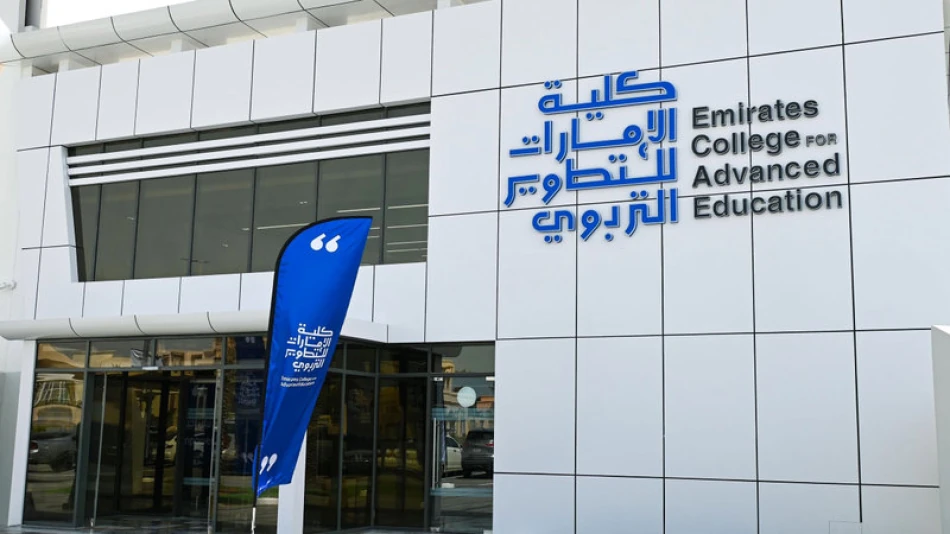
UAE Educational Development Center Welcomes 500 Students for the New Academic Year
UAE Educational Development College Sees 500+ New Students as Emirates Doubles Down on Teacher Localization
The Emirates College for Educational Development has welcomed over 500 new students across three campuses for the 2025-2026 academic year, marking a significant surge in enrollment as the UAE accelerates its push to replace expatriate teachers with locally-trained nationals. This strategic expansion reflects the country's broader vision to achieve educational self-sufficiency while integrating cutting-edge technologies like artificial intelligence into teacher training programs.
Strategic Push for Educational Emiratization
The substantial increase in student enrollment represents more than just institutional growth—it signals the UAE's commitment to reducing dependence on foreign educators. The college's comprehensive orientation program, held simultaneously in Abu Dhabi, Al Ain, and Ajman, demonstrates a coordinated national effort to build teaching capacity across all emirates.
Dr. Mai Laith Al-Taie, Director of the Emirates College for Educational Development, emphasized that this initiative aligns directly with the UAE's Vision 2031 and the Emirates Centennial 2071 plan. These ambitious frameworks envision a knowledge-based economy powered by Emirati talent across all sectors, with education serving as a critical foundation.
Addressing the Teacher Shortage Challenge
The UAE's education sector has historically relied heavily on expatriate teachers, particularly in STEM subjects and English instruction. This dependency creates continuity challenges and limits the integration of local cultural values into curricula. By dramatically expanding its teacher training capacity, the Emirates College is positioning itself as a cornerstone of educational localization.
The college's strategic participation in various career fairs and recruitment events has clearly paid dividends, attracting a new generation of Emirati educators who will shape the country's academic landscape for decades to come.
Technology-Driven Teacher Preparation
What sets this expansion apart is the college's integration of artificial intelligence and digital manufacturing capabilities into teacher training. The orientation program included tours of the Digital Manufacturing Lab (Fab Lab) and the Continuous Learning Center, exposing new students to technologies that will define 21st-century education.
AI as a Strategic Educational Tool
The college's emphasis on artificial intelligence training reflects global trends in education technology. Countries like Singapore and Finland have similarly invested in AI-enabled teaching methods, recognizing that future educators must be comfortable with technology-enhanced learning environments.
By preparing teachers to "effectively and responsibly" deploy AI tools, the UAE is positioning its education system ahead of regional competitors who may still rely on traditional teaching methods.
Regional Context and Global Implications
The UAE's teacher localization strategy mirrors similar initiatives across the Gulf Cooperation Council. Saudi Arabia's Vision 2030 includes comparable goals for educational self-sufficiency, while Qatar has invested heavily in domestic teacher training through partnerships with international universities.
However, the UAE's approach appears more comprehensive, combining large-scale enrollment increases with cutting-edge technology integration. This dual focus could provide a competitive advantage in attracting international students and establishing the Emirates as a regional education hub.
Investment in Long-term Educational Infrastructure
The presence of Suleiman Al-Kaabi, Assistant Undersecretary for Professional Development at the Ministry of Education, at the orientation program underscores government-level commitment to this initiative. Such high-level participation suggests that teacher localization receives priority funding and policy support.
For investors and education technology companies, this expansion represents significant opportunities. The UAE's willingness to invest in AI-enabled teaching tools and digital learning platforms creates a growing market for educational technology solutions tailored to Arabic-speaking contexts.
Measuring Success in Educational Transformation
The true test of this initiative will come in the next five to ten years, as these newly trained teachers enter classrooms across the UAE. Key metrics will include student performance outcomes, teacher retention rates, and the successful integration of AI tools into daily instruction.
The college's commitment to "globally accredited academic qualifications" suggests these graduates will meet international standards, potentially making UAE-trained teachers attractive to other countries in the region facing similar localization challenges.
Most Viewed News

 Sara Khaled
Sara Khaled






